MiDojo
Each one. Reach one. Teach one.
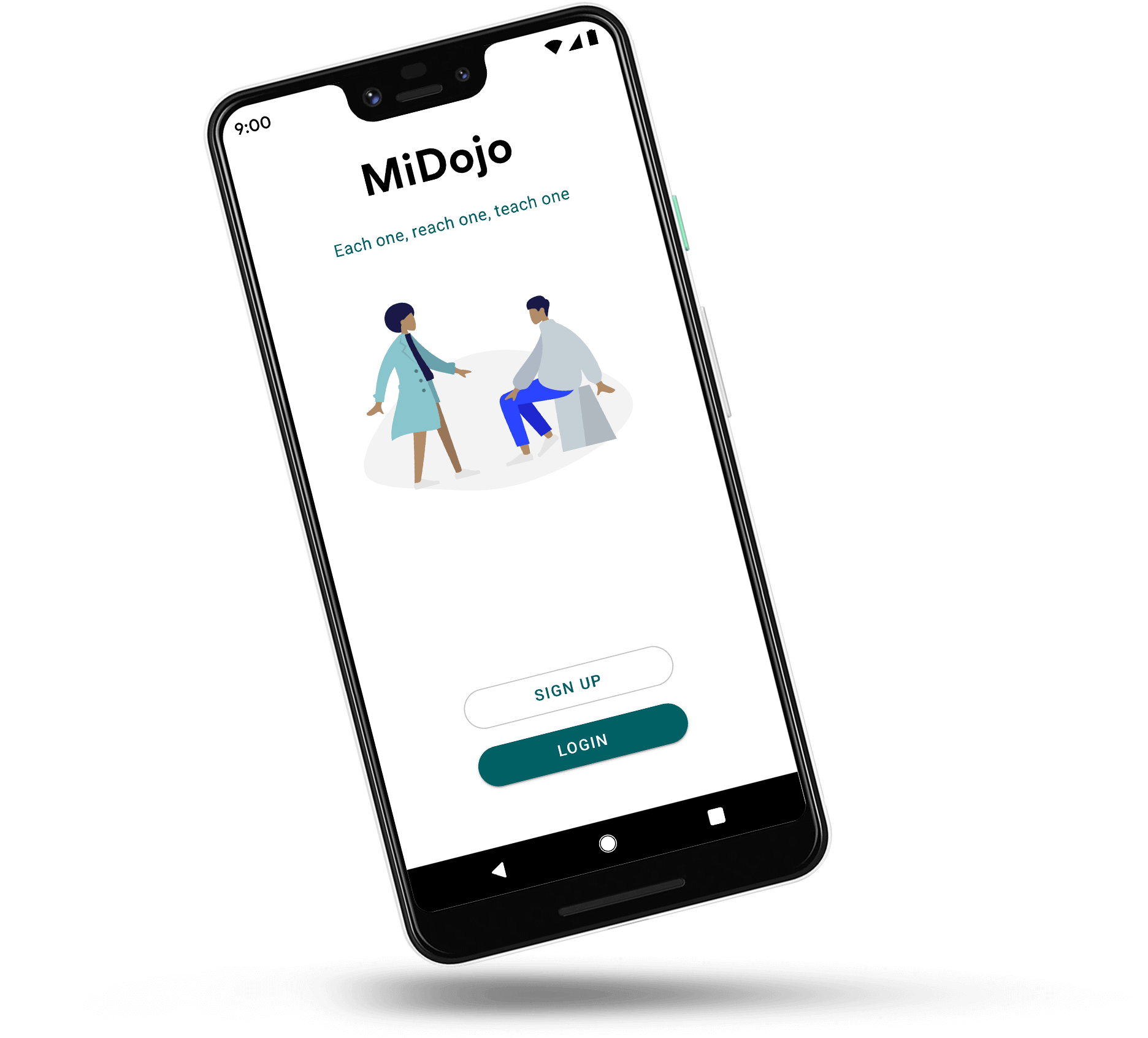
Overview
MiDojo is a networking app for professionals and students to seek mentorship. Mentorship is known to do wonders for one's career growth. From the initial research, I learned that most mentorship connections are made in the workplace, professional events, etc. This creates a rather tall barrier for people to approach each other. Even mentees are often confused about this relationship. If they expect a lot from the mentorship, the mentor will be unhappy. A steady loop of smart questions, feedback and results can work in their favor.
With MiDojo, I have tried to identify mentor and mentee’s pain points and emotions. I have then addressed these issues by proposing a social network dedicated to mentorship.
role
UX Designer & Researcher
Design Tools
Sketch, Illustrator, Material Design Plugin
Prompt
Mentoring can be a great way to share knowledge and help someone be successful in their personal or professional life. But many potential mentors are often too busy to commit to regular meetings, or they have a hard time connecting with people seeking help. Design an experience where prospective mentors and mentees can be matched, based on similar interests, location, and availability.
Research Findings
Mentors are
Experienced professionals, who may have only a few more years of experience than the mentee.
Mentors want to
-
Give back to the community.
-
Get new perspective from younger professionals or students.
-
Learn by teaching
Mentors like it when
-
The mentee is enthusiastic and eager to learn.
-
They share common interests with mentee.
-
They see the result of their help.
-
Mentee makes an effort to ask smart questions, which cannot be found online.
-
The time commitment is limited and predictable.
Mentees are
Anyone who seeks advice to further their career or hobby.
Mentees want
-
Personalized comment on their doubts, projects which are too specific to be found online
-
Advice on prioritizing goals, learn relevant skills and career advice.
Mentees like it when
-
Mentors have similar background. They can empathize and advice.
-
Mentors can meet fairly regularly.
-
Mentors are invested, and make effort to help the mentee.
High Fidelity Prototype
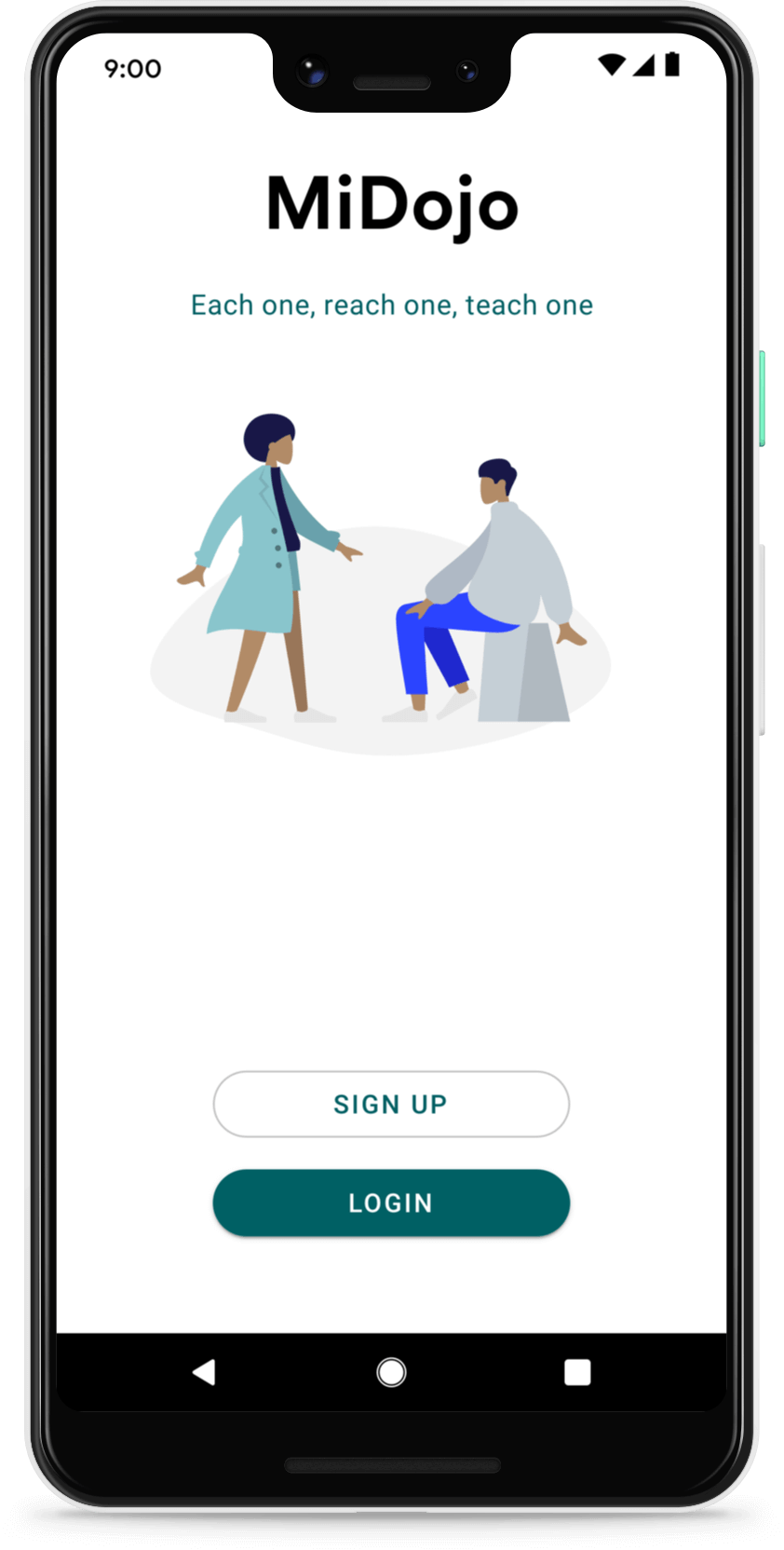
Welcome Page
The mentor and mentee can use the same app to get on MiDojo. The welcome screen has a standard login and signup options.
Onboarding
New users are educated about mentorship, and how the app is designed to solve their problems.
Onboarding introduces new features, vocabulary, and also alleviates some pre conceived notions. In this case, we want mentors to know that they don't have to be seasoned veterans to help, and mentees should understand that it's okay to ask for help.
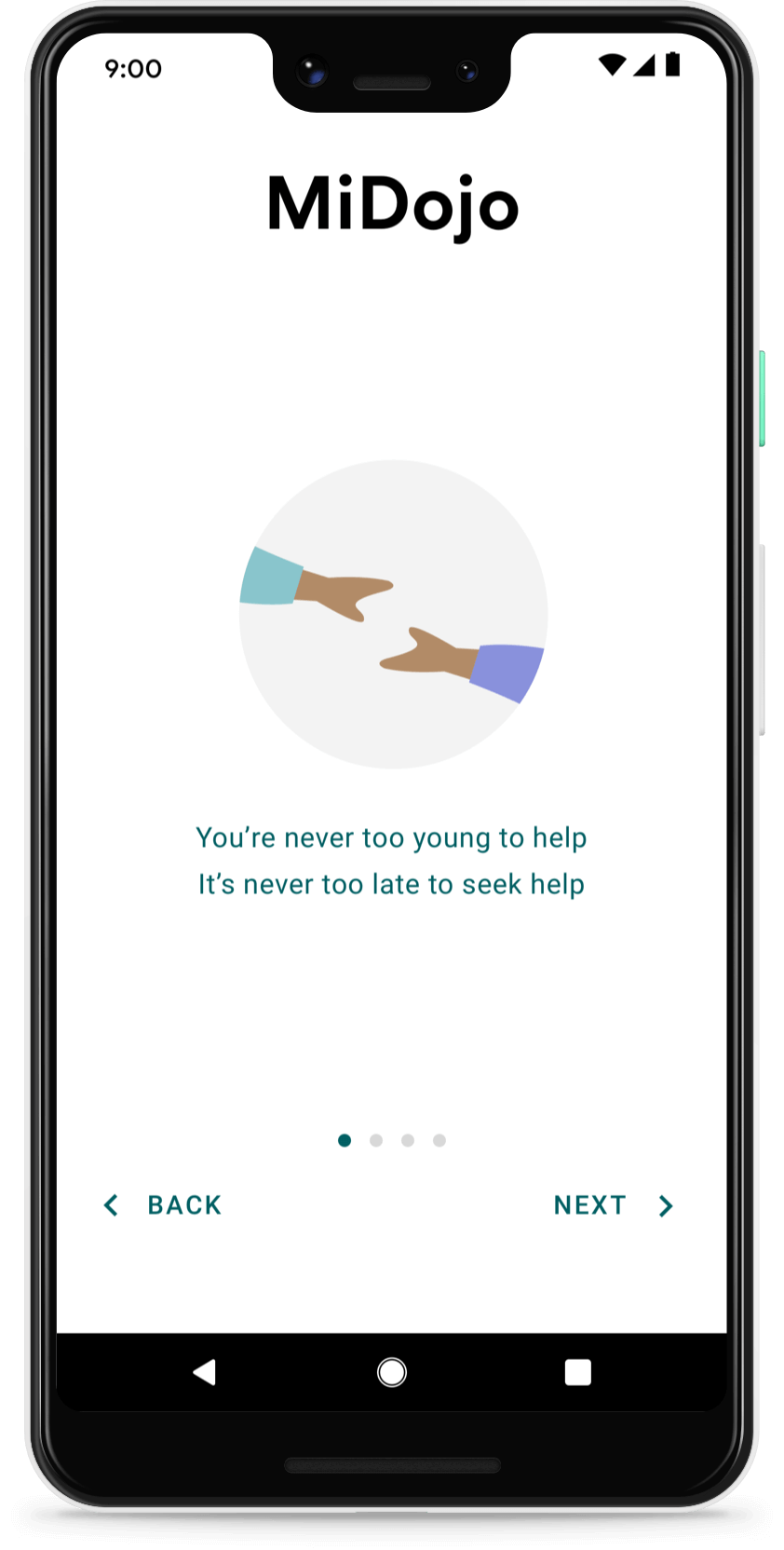
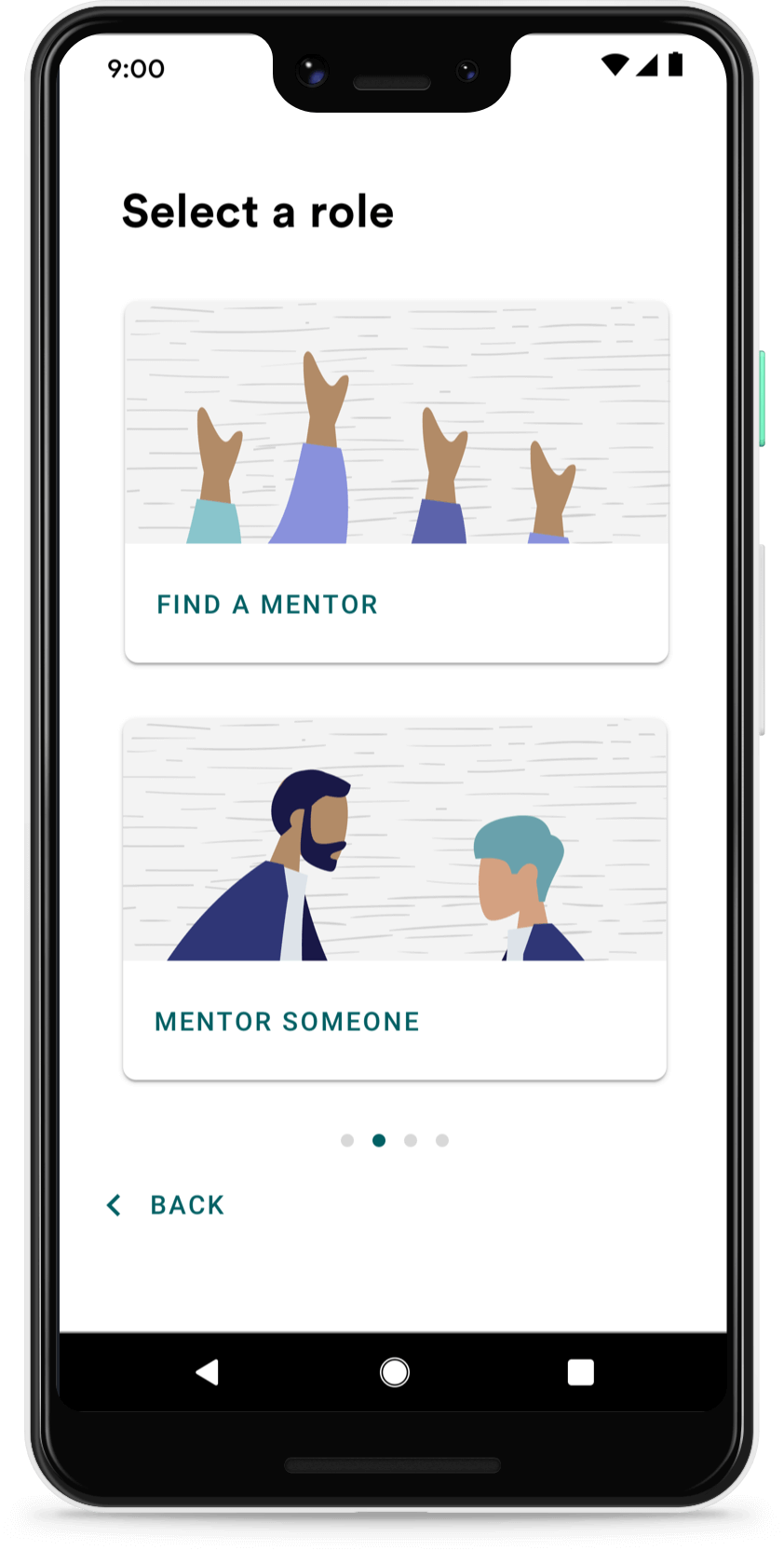
Select Role
The user chooses if they want to mentor or look for mentors. The app experience from here will be different for the mentor and the mentee.
Mentor Experience
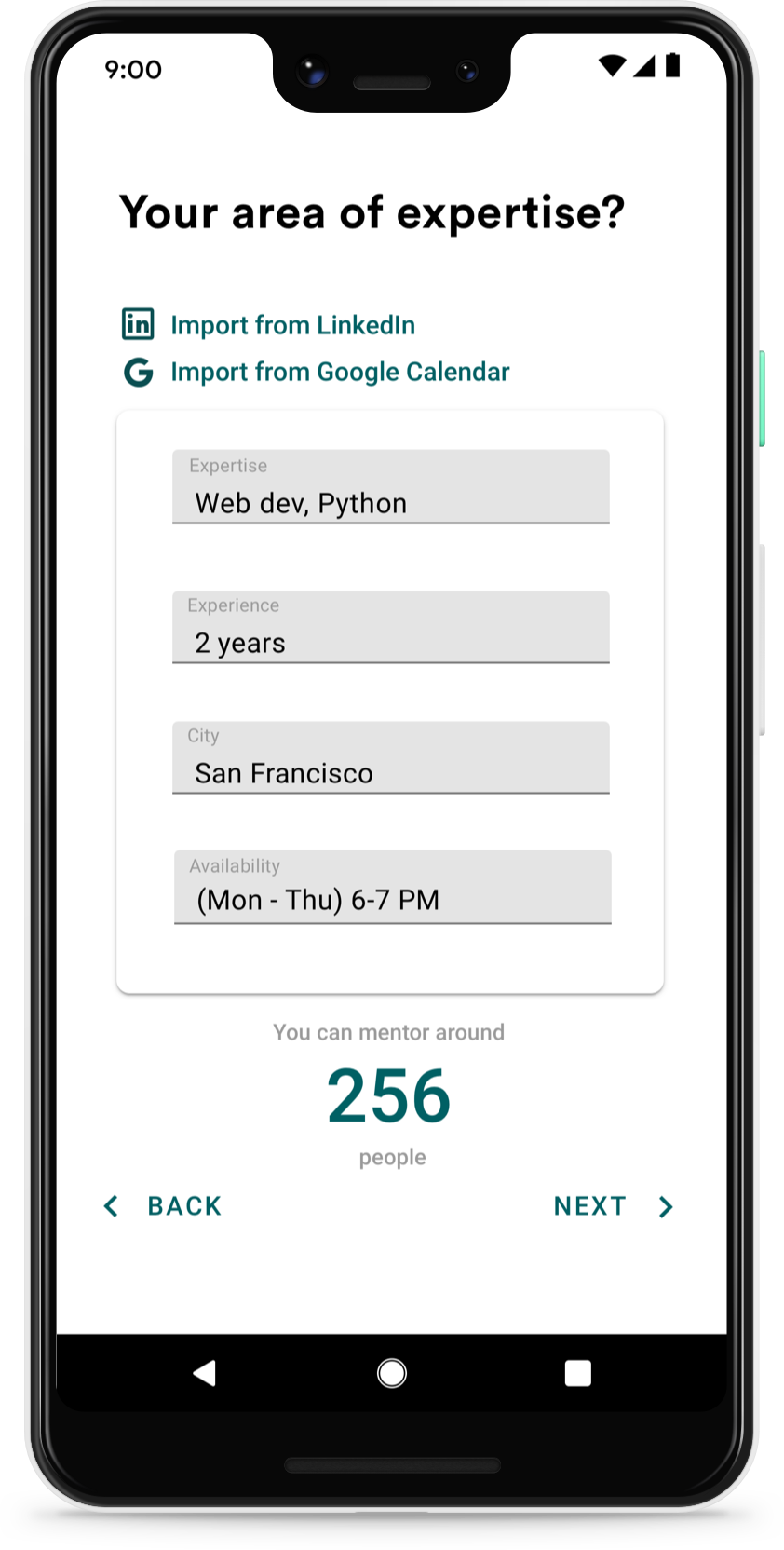
Gather useful information for matching
Necessary metadata such as expertise, experience, and the location is taken by the new mentor. This will help us to match them with mentees. A live counter tells the approximate number of mentees they can be of use to with the information input.
Filling forms is a tough task indeed. Social logins are provided to automate this as much as possible. Amusing elements like the people counter helps sustain the user longer.
Set your time commitment. More time ~ more mentees
Mentors can assist more than one mentee, depending on the time they can expend. The mentees are assigned accordingly.
Asking tough questions like this can nudge the mentor to think seriously about the mentorship program. The downside is ofcourse, abandonment at this stage. But it should positively affect the mentee experience. The illustration is live, as the user slides to a higher value, more "humaaans" are added.

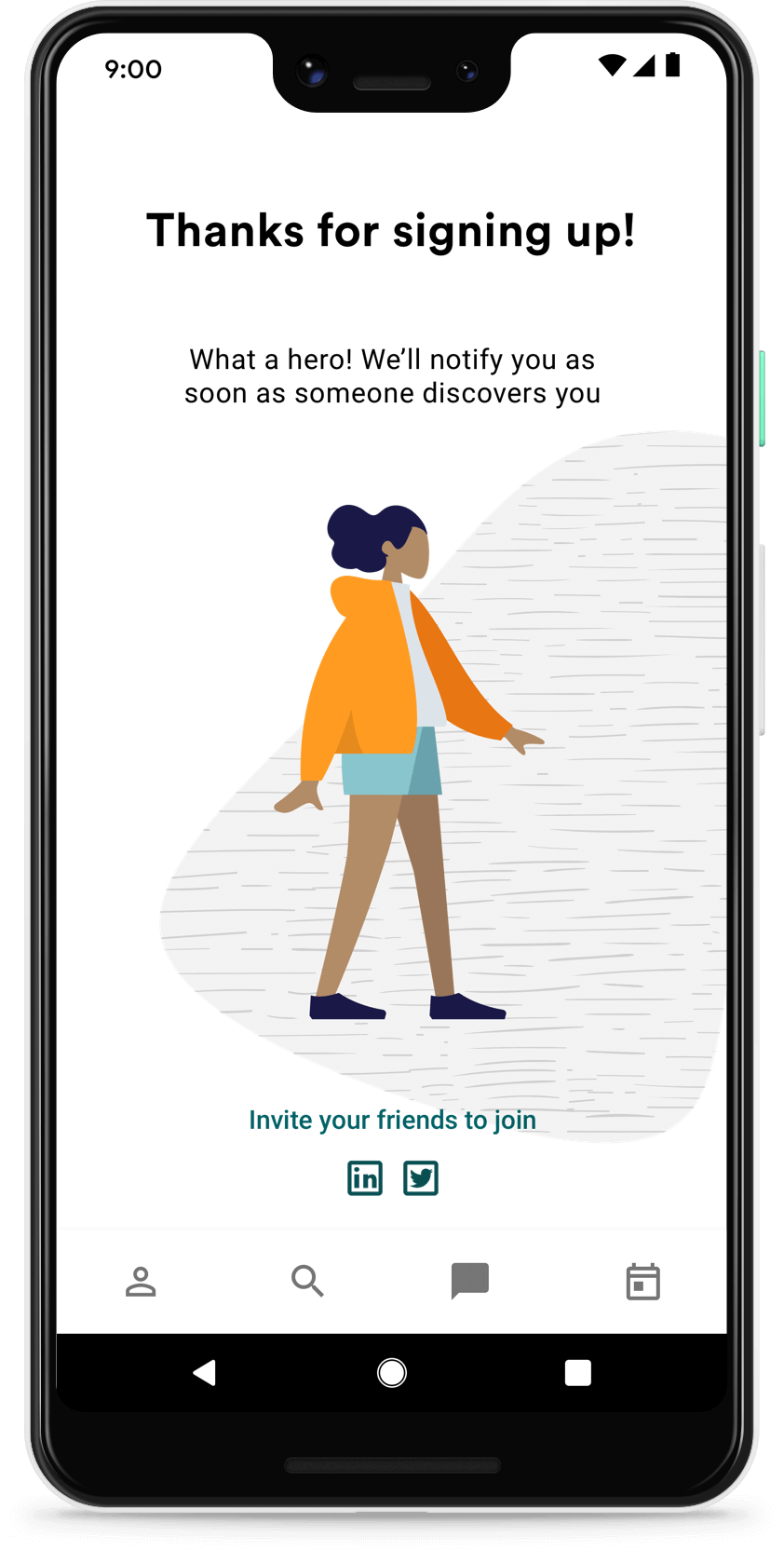
Ready to start helping! Spread the word
A screen to show that the signup process is complete. Social share options are available.
Designing this screen was a bit challenging. I wanted the mentor to have some form of positive experience after the tedious signup process. Perhaps social share might do the trick.
Smart way to select your mentees
Mentor receives requests from the mentees in the app inbox.
Research revealed that mentors shouldn't be seen as long term friends/guru. Mentors are more willing to help, if they have a good idea of what they're getting into. The mentees are prompted to draft a clear request, and the same is highlighted to the mentor.
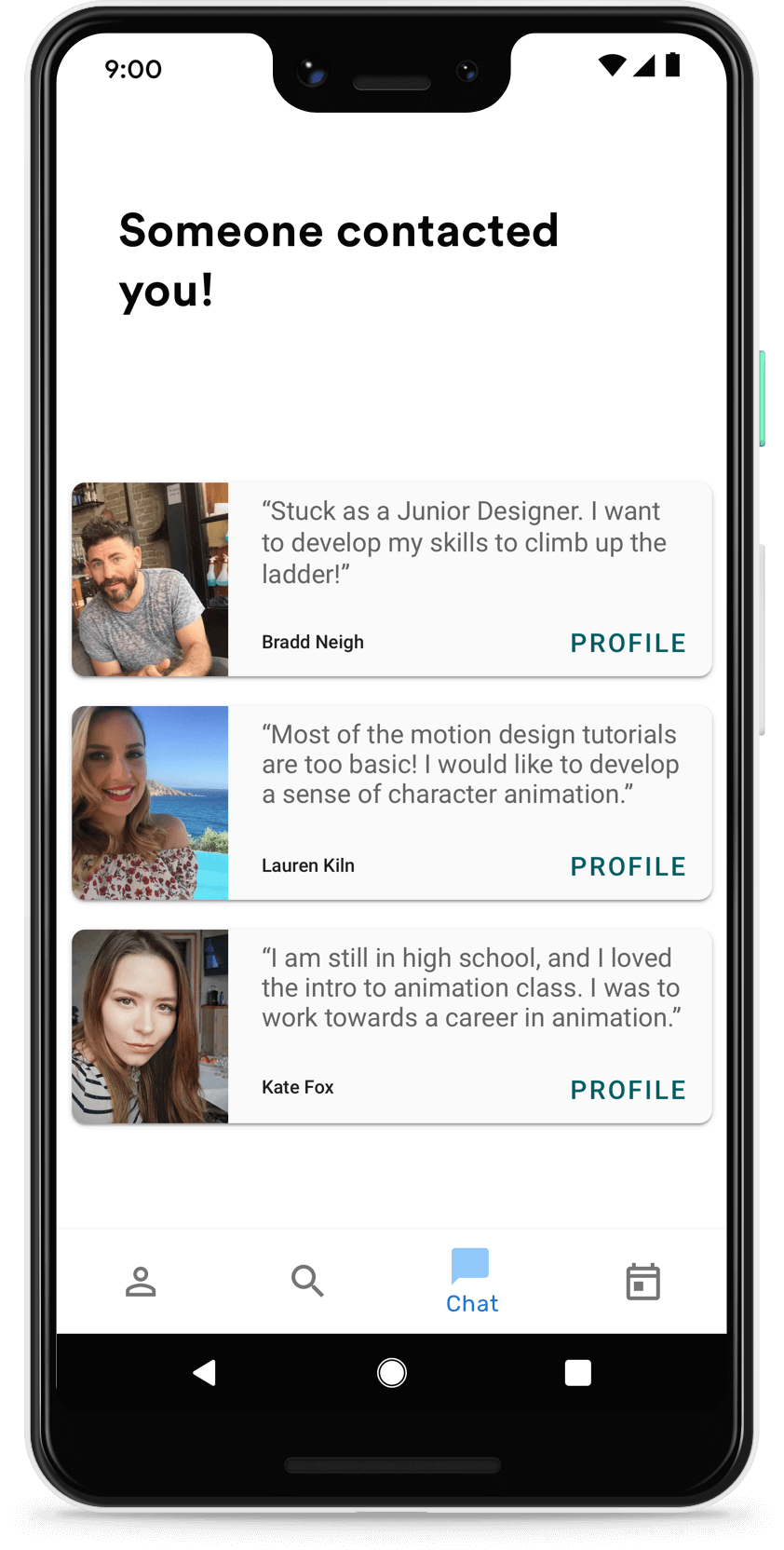
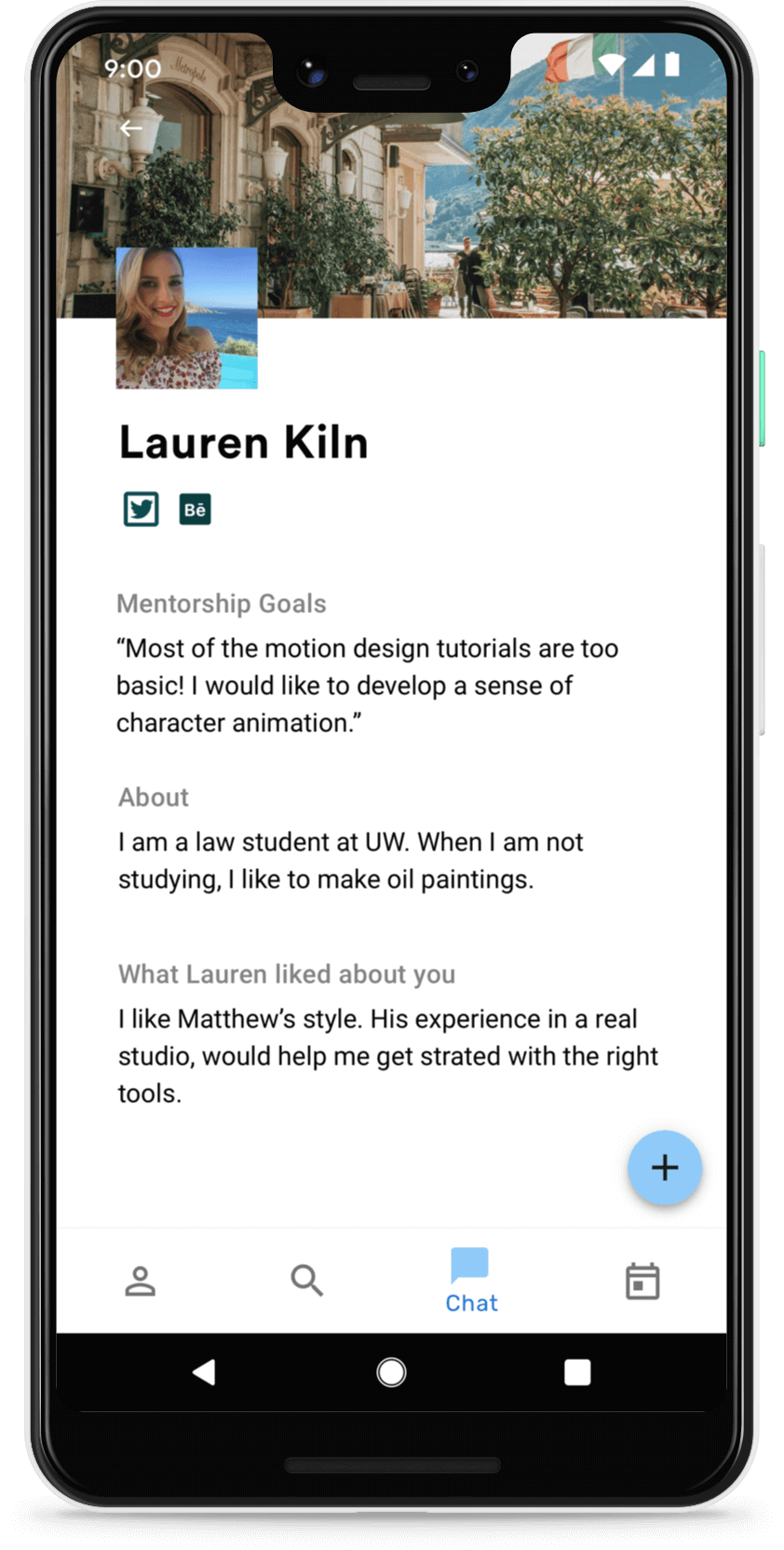
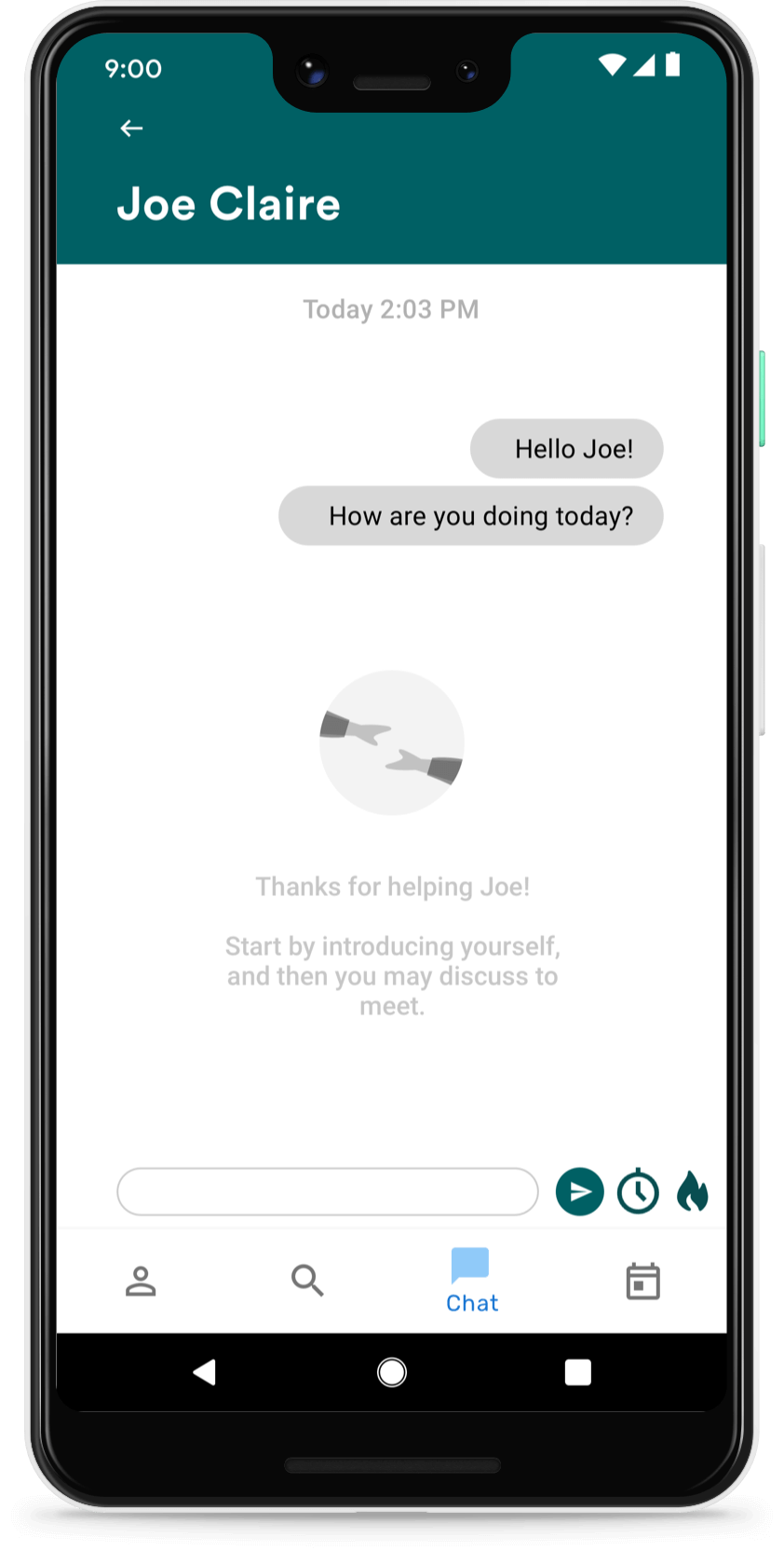
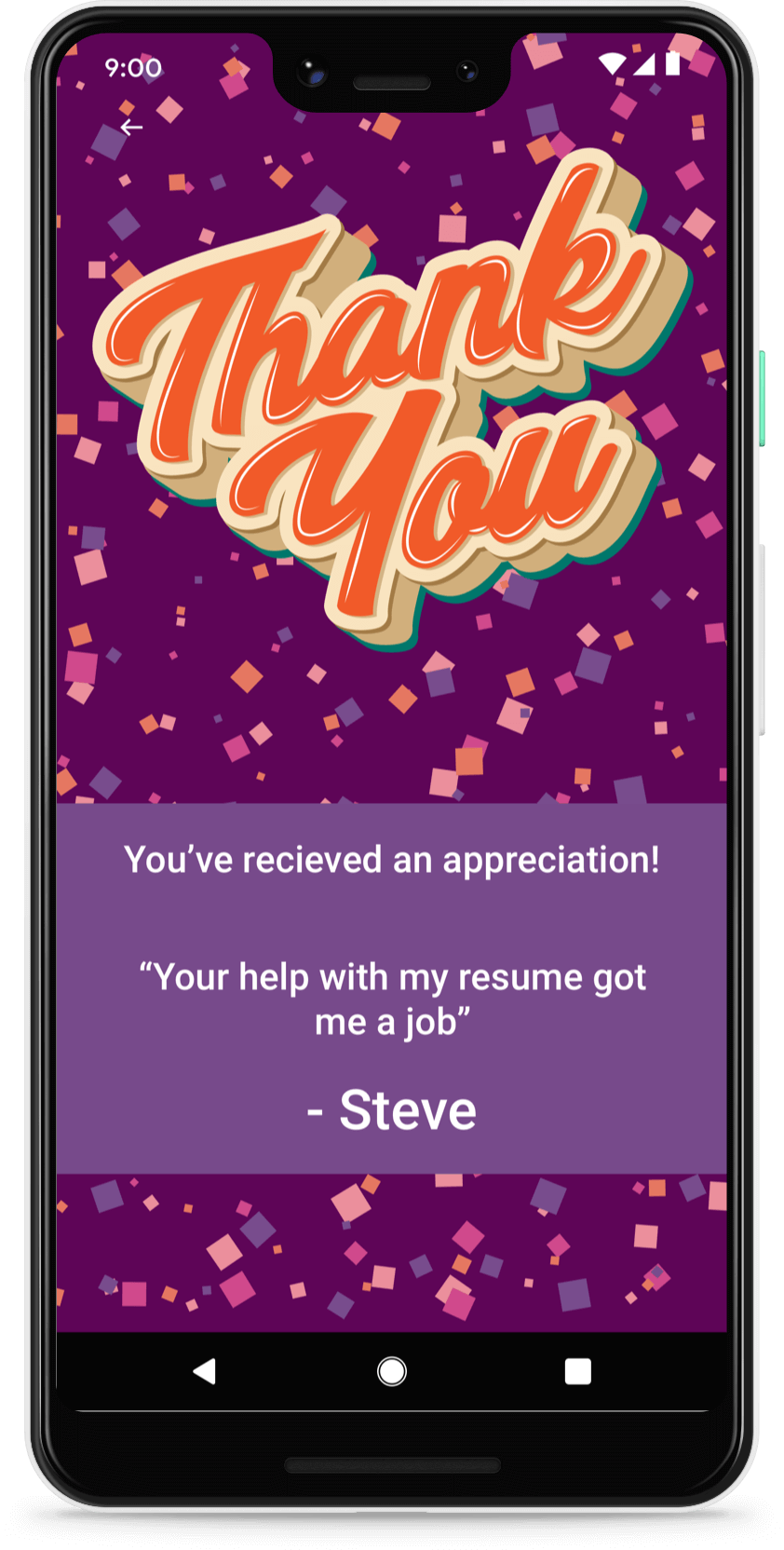
Start helping & get "hooked"
Mentors get the pleasure of earning "fans" on the way. The mentor-mentee relationship has the potential of forming a habit. (as define by Nir Eyal)
Trigger (notification)
Action (chat response)
Variable Reward (mentee feedback in forms of personalized appreciation cards)
Investment (selecting and giving advice)
Mentee Experience
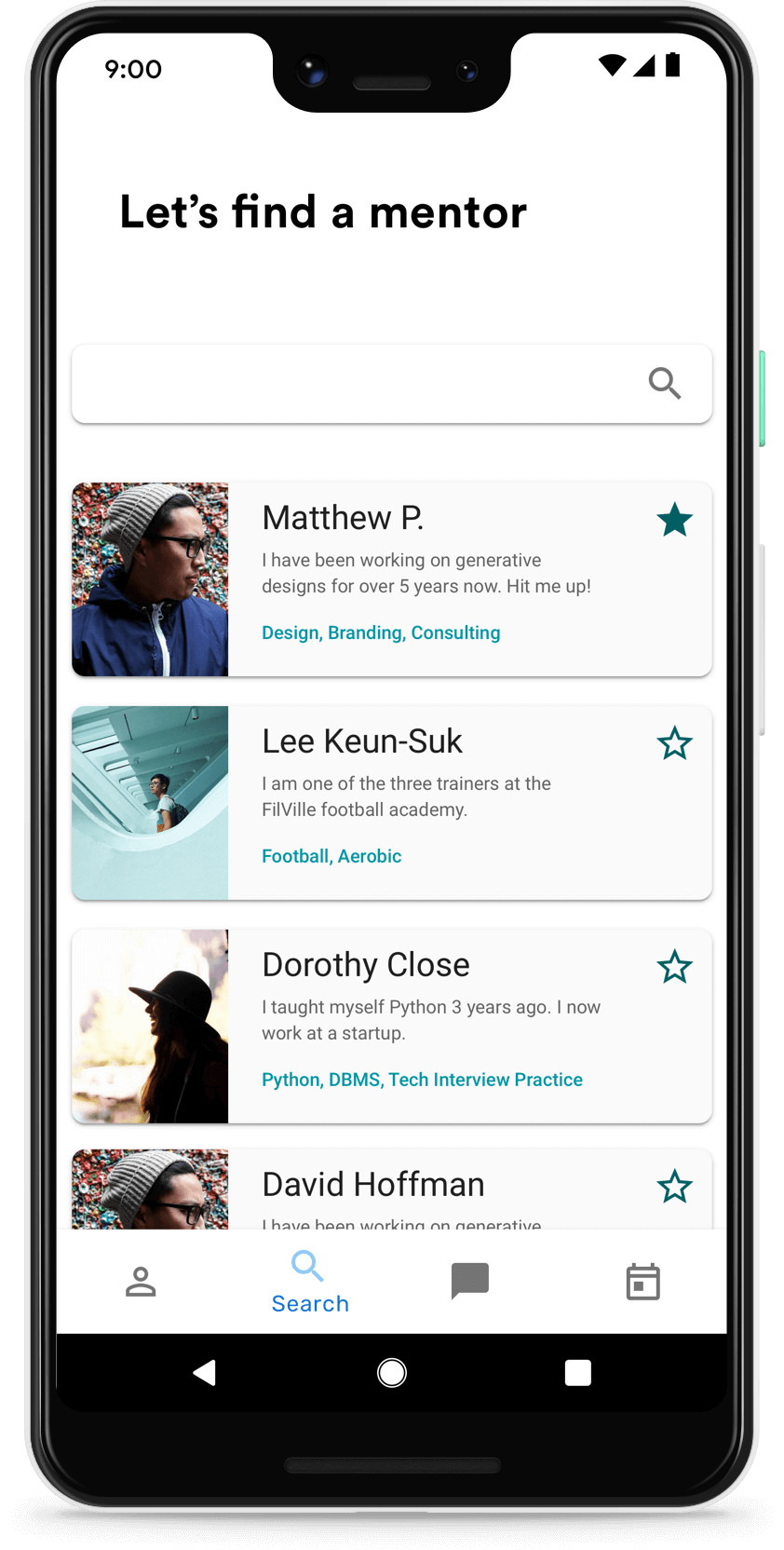
Finding the right mentor
Once the mentee has filled the appropriate information, they look through the list of mentors on the platform. To assist their search, description and key competencies are displayed with their profile. Since the sorting process can be overwhelming, profiles can be starred to mark and come back later.
Relevant Results. Quick!
MiDojo offers mentors to further ones' fitness goals and hobbies too. Powerful search options can be used to get to the right mentor.
Based on the mentee's preference, available mentors are shown. A reasonable set of filters are available to help narrow down. Filters are limited in their power, to let user to explore more. A star feature is available to scan and shortlist.
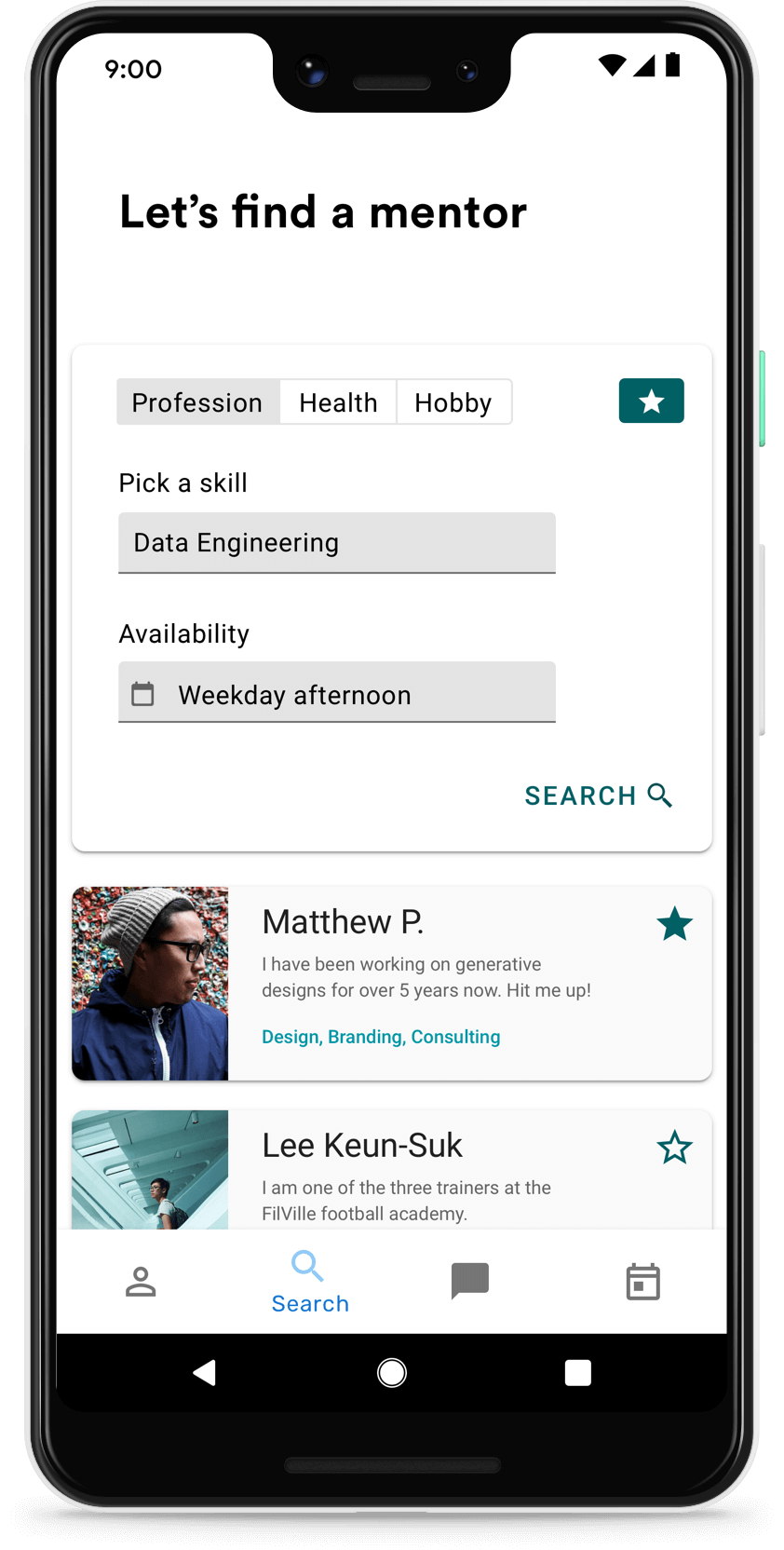
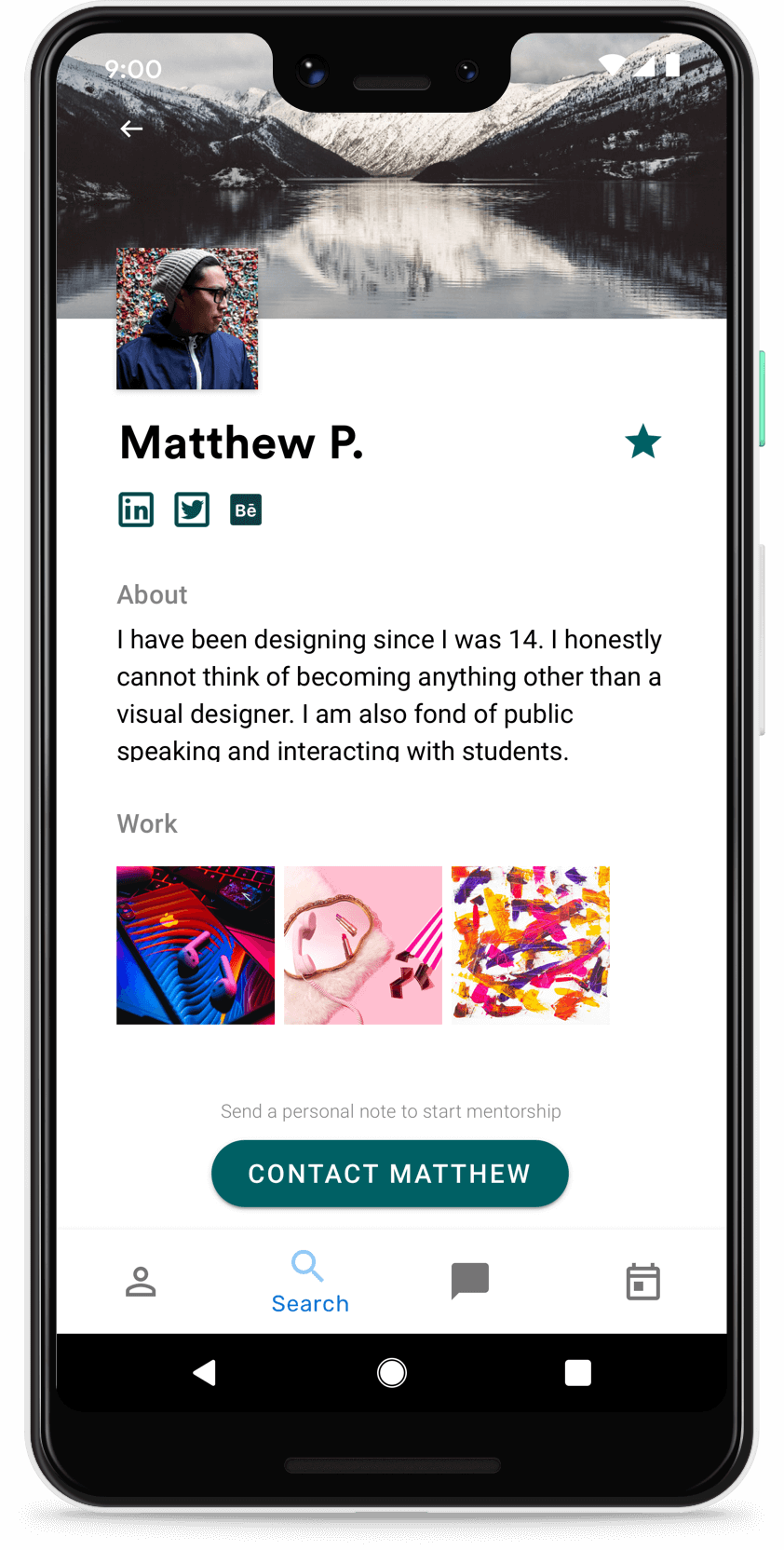
Discover the future you
Apart from linking their Linkedin and Behance profile, mentors are allowed to write a bit more about why they want to mentor and what they seek out of it, and any additional data. A basic gallery is also provided to showcase work without leaving the app.
The contact mentor is not available on the search result page. This is to nudge them into glancing at the mentor profile before they can apply.
Personalized requests
Depending on the volume of applications, mentors can be picky. Questions act as a set of guidelines to allow mentees to approach more effectively.
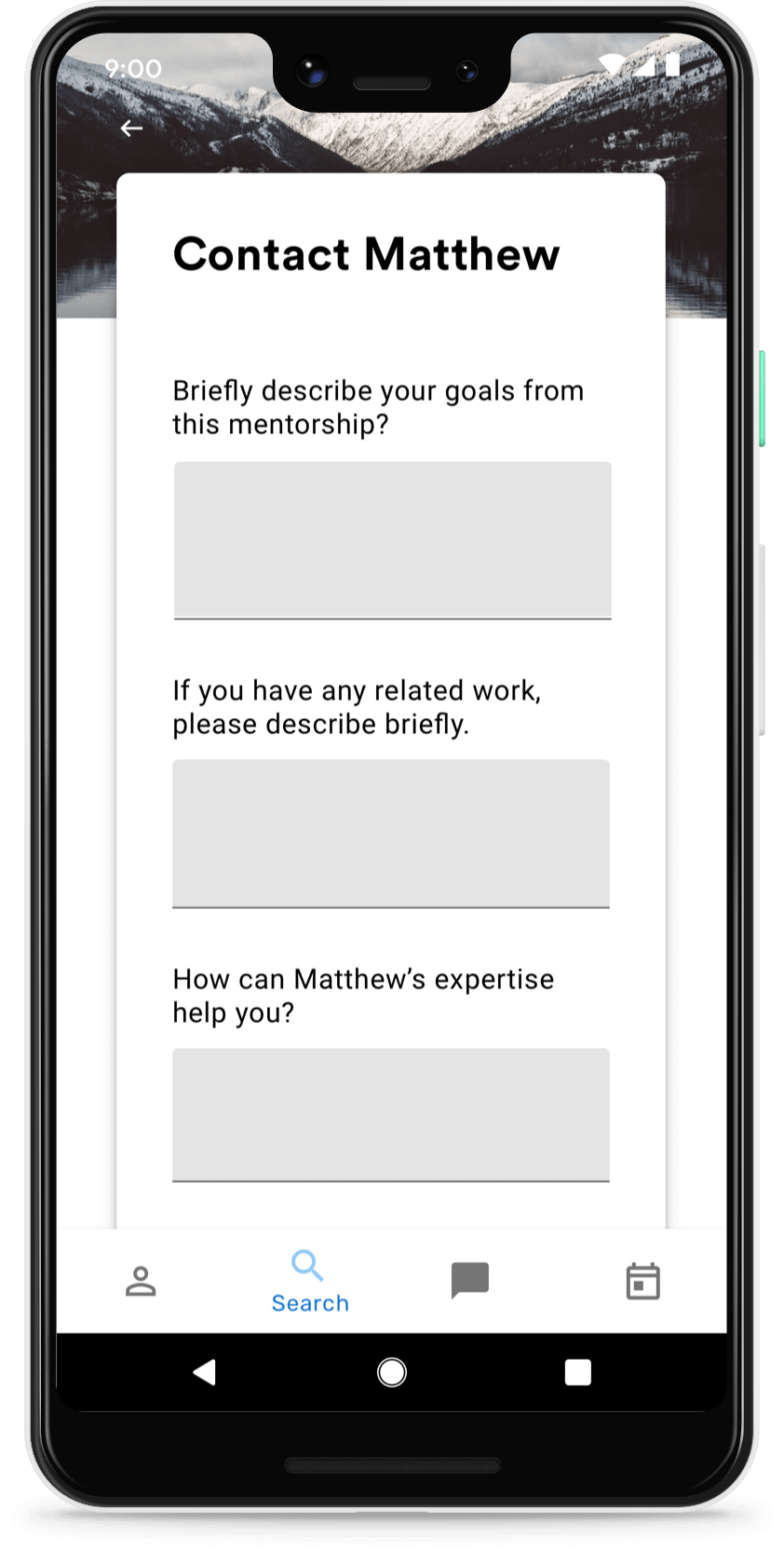
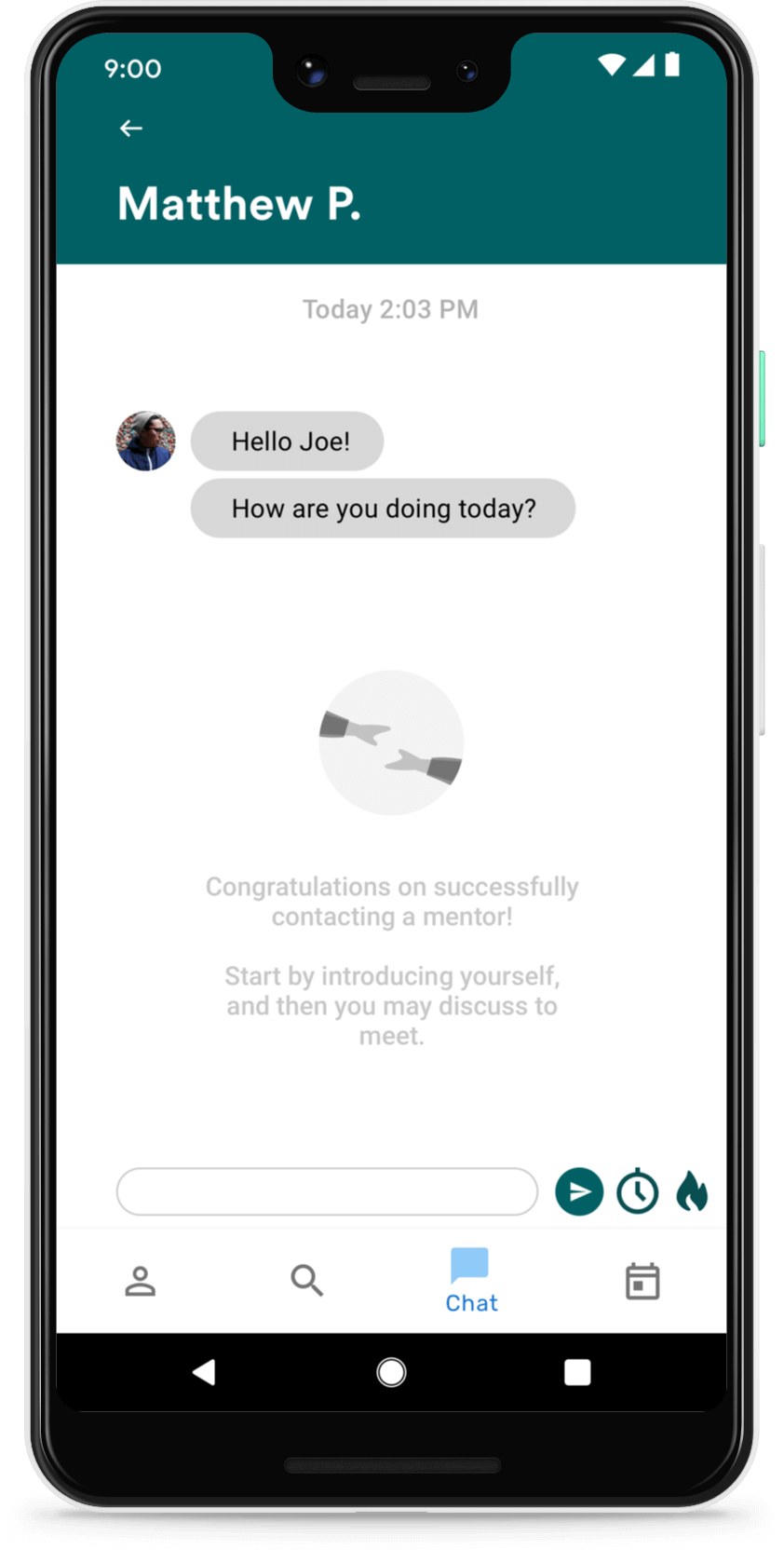
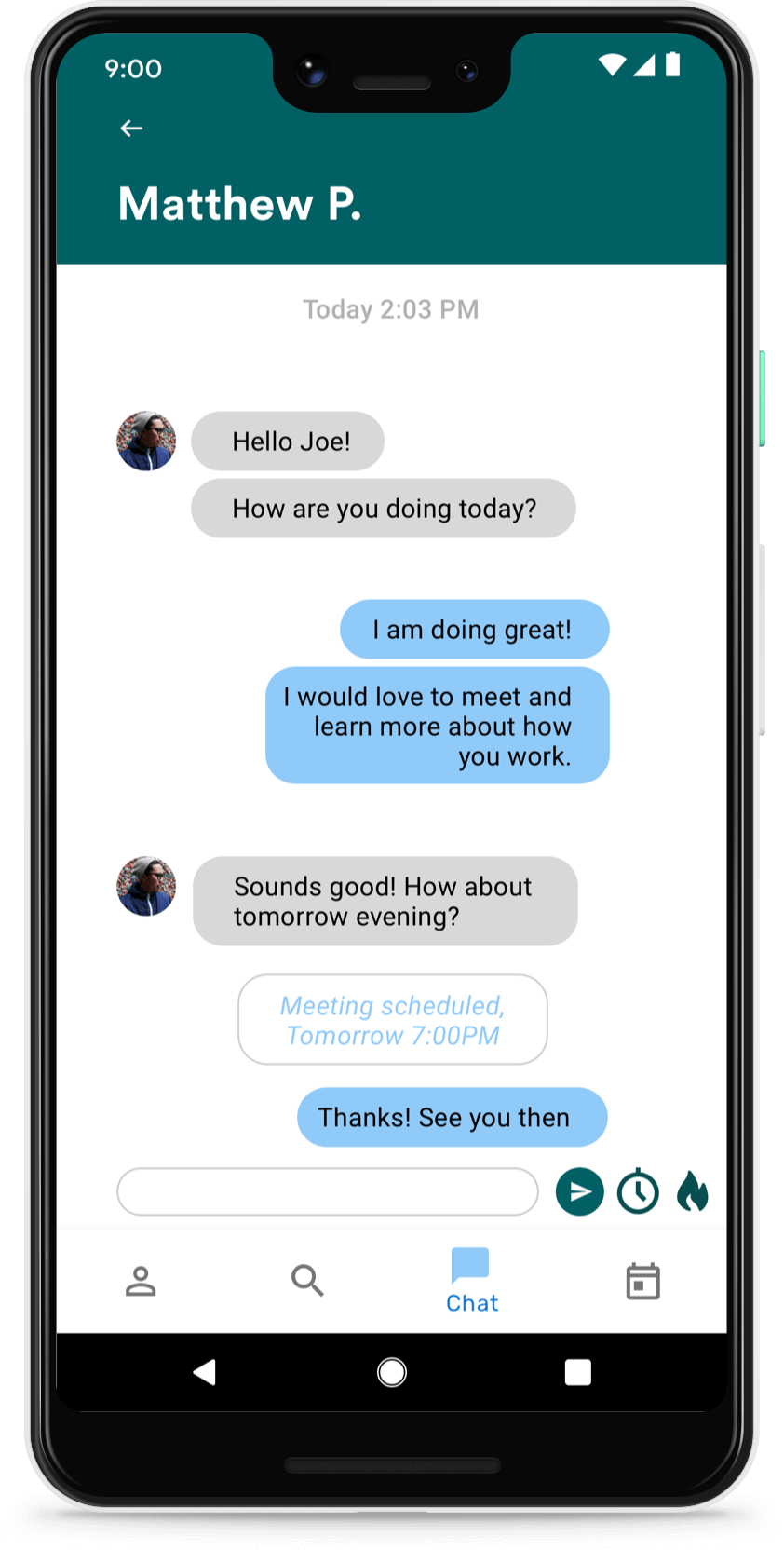
First Chat
This is the first chat between two strangers! To make the first chat a bit comfortable, suggested topics are mentioned as help text. The two are prompted to introduce themselves, discuss their interests and plan a meeting.
Some automation may be introduced to suggest meeting times and places, but I decided to keep it simple to avoid distractions.
The Research
As an aspiring UX Designer, the concept of mentorship isn’t alien to me. I have heard people talk about it on podcasts and write in lengths about it on their blog posts. I have had the opportunity of working with some fantastic designers and researchers over the past few years, and I have reached out to them in times of need. However, I had been apprehensive about finding mentors myself. For the sake of this project, I started with a blank slate, assuming I knew nothing about mentorship for career growth (well, there was a lot that I didn’t know). I also looked at mentorship without the UX lens. Mentorship is obviously, practiced in other professions as well.
Secondary Research
Several journals, articles, blogs and online boards helped me discover different perspectives on mentorship.
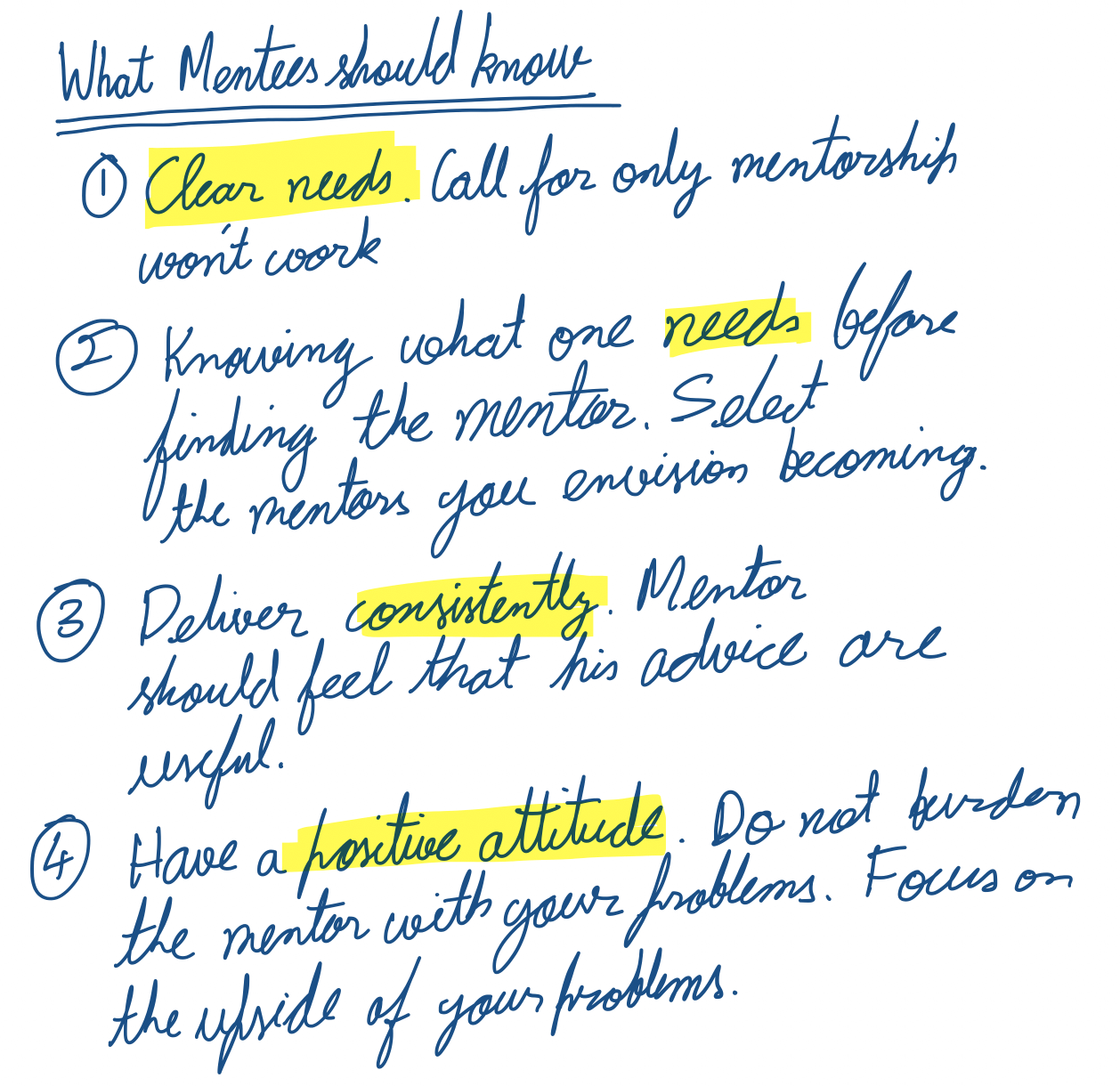
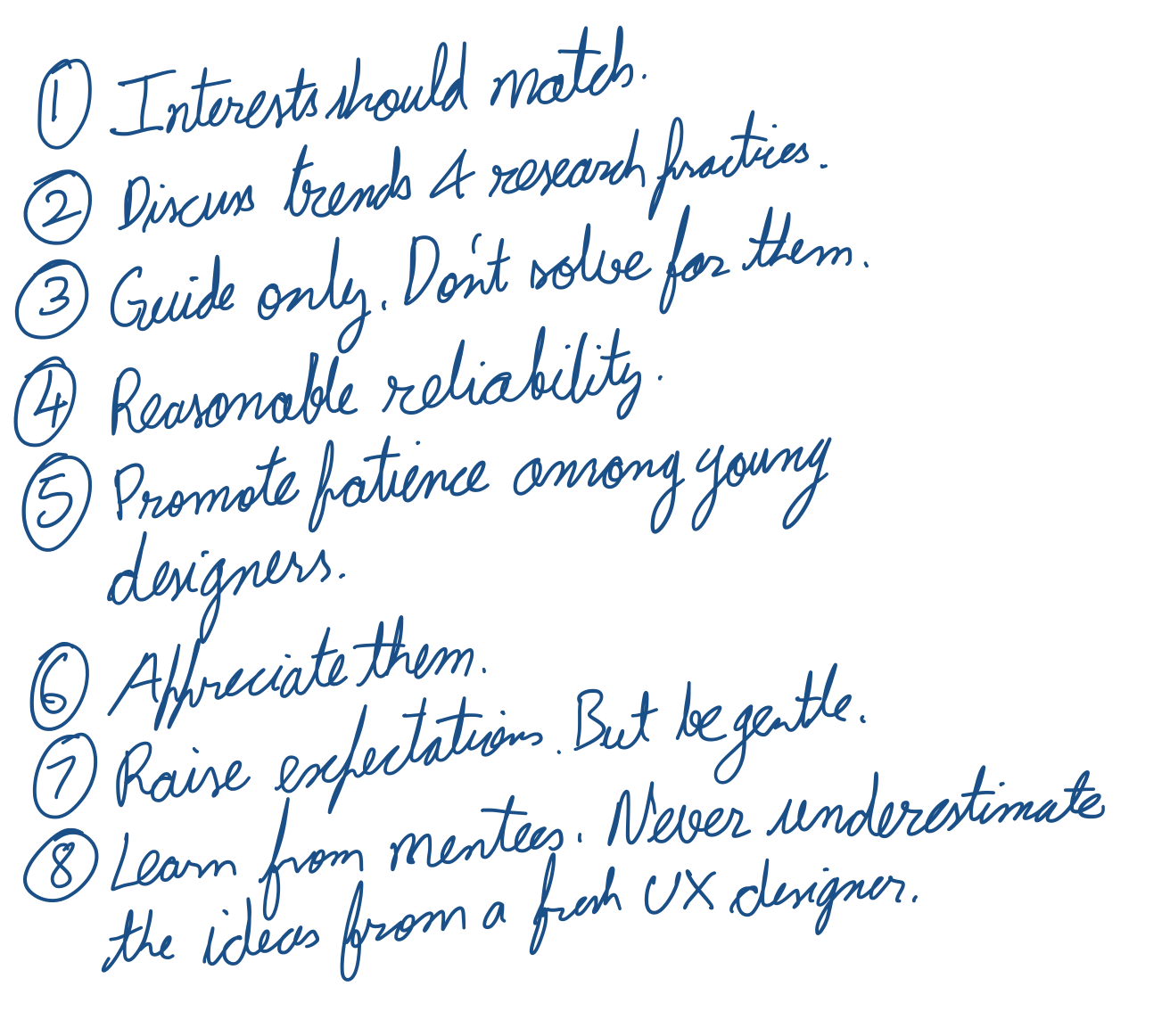
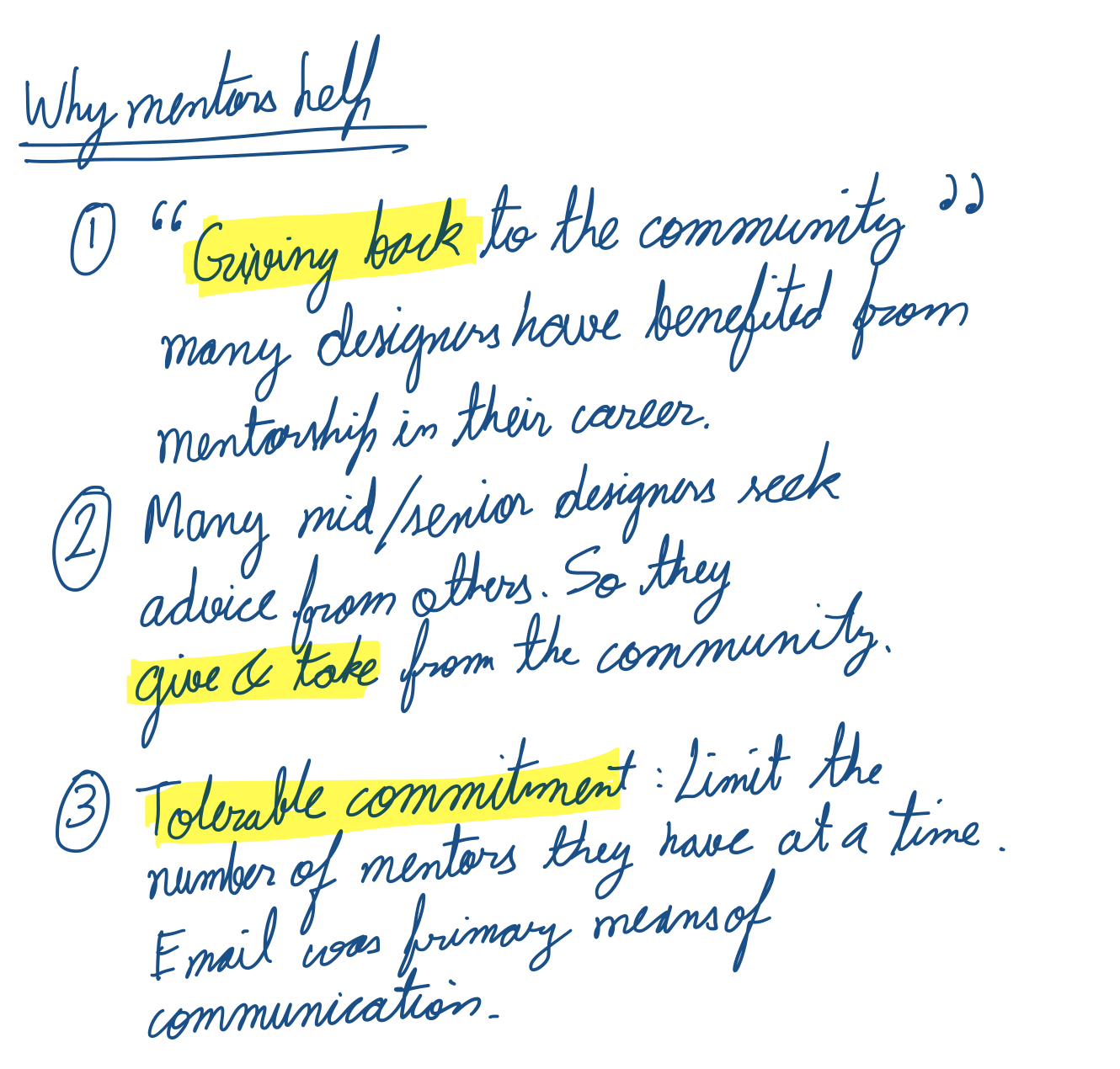
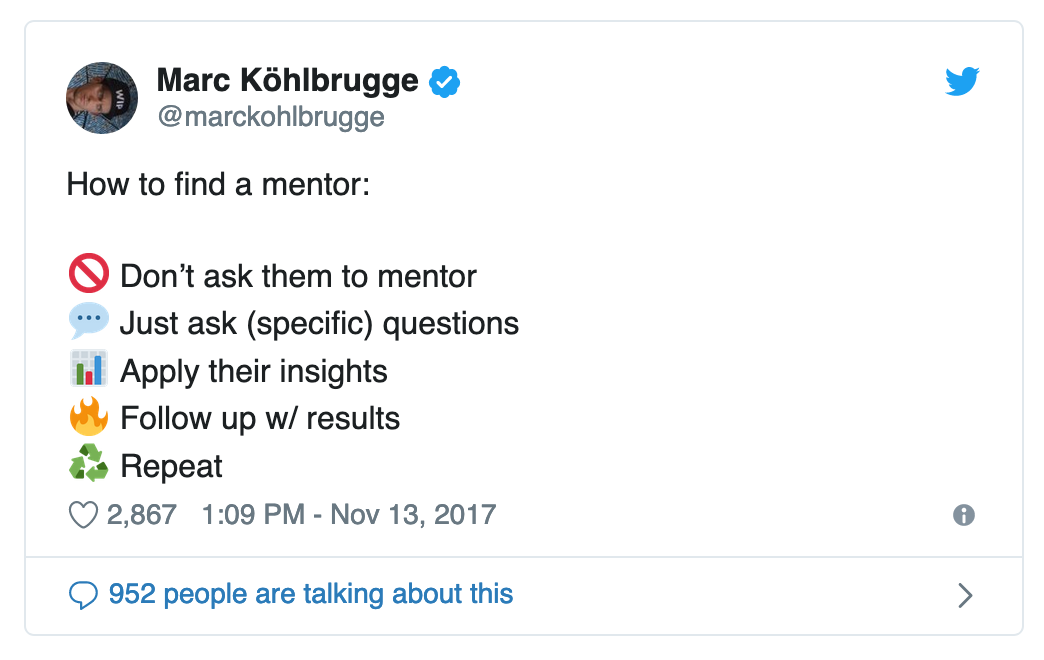

Primary Research
To gain some first-hand knowledge on this, I contacted one senior UX Designer and two junior designers. Some of the finding/interesting quotes:
Mentor: A Chief Design Officer with 10+ years of experience
"It’s my way of giving back to the community. I remember my struggle when I was working as a visual designer."
"Some companies have one or a few designers. Mentorship can help the individual grow in such cases."
"Many designers approached me via LinkedIn for specific problems …. We contacted just over email."
".. have met people face to face also .."
"my colleagues told me that they had worked for this amazing designer at xxx company, and I reached out to him via emails for some questions."
Mentee: A design student who met her mentor at her workplace
"We had a formal mentorship program. But that was only on paper. All the interns interacted more with others."
"My shared several good moments. We talked about work, our backgrounds, how goal oriented she was. How she prepared for design thinking workshops. …. She’s a giver, she’s willing to share experience …. She has a good impression of me."
"I learned a lot from her, looking at her hard work, her dedication, she was a role model"
On being asked if they’re still in touch: “I’m always willing to keep in touch. But I worry that she’s too busy. She may think that I am interested in a job opportunity there.”
On being asked what got the mentor interested in her: “My prof put in a good word. We also had the same education, so that got her interested.”
Key Findings
What drives a Mentor?
"Do unto others as you would have them do unto you." Mentors need not be expert in their field, they can also be a few years senior to the mentee. It is possible that they might be seeking mentorship themselves. Mentorship then, is a way to give back to the community.
Mentors like being seen as stars or role models, and get some fan mail! It is a positive reinforcement of their knowledge.
When mentorship is not seen as a life-long commitment to coach someone, mentors are willing to help. It is seen as a simple act of kindness which gives personal gratification.
What drives a Mentee?
According to Maslow’s hierarchy of needs, self-actualization is a high form of motivation, where an individual strives to be the best, and achieve their full potential. The opinions of others don’t matter much. An ideal mentee has the following characteristics for a positive mentorship experience:
Clear needs: Has a good idea about their goals. They do not need complete a hand holding.
Deliver consistently: One way to show the mentor that they’re invested in the relationship is to show that their advice is taken seriously.
Positive attitude: Mentors appreciate when the mentee has a positive attitude towards the work they’re doing. The relationship might not be thick enough to share sorrows.
Synthesis
I used the following methods to gain a better understanding of the information I got from the research
From To table
Helps formulate goals/requirements for the solution.
| - | From | To | Instrument |
|---|---|---|---|
| Discovery | People meet mentors at events, or work settings. | Seeking mentor can be structures and easier to allow wider range of people to use it. | List possible mentors, mentees |
| Time commitment | Uncertain, long meetings. | Meetings with goals, agenda. | Chart availability, schedule goals |
| Confidence to ask for help | Shame/fear when asking for help. Loneliness, confusion. | Gain confidence by being in a community, where it is normal to ask for help. | Use several instruments to normalize seeking help. |
| Selecting mentors | Searching on Linkedin for hours. They don’t have information regarding time availability etc. | Structured data to fill, focused towards | List useful metadata to find mentors. |
Love letter & Breakup letter
I wrote a love letter and a breakup letter to my application from the perspective of the mentor and mentee. This helped me prioritize the requirements.


Before the mockups
Storyboarding
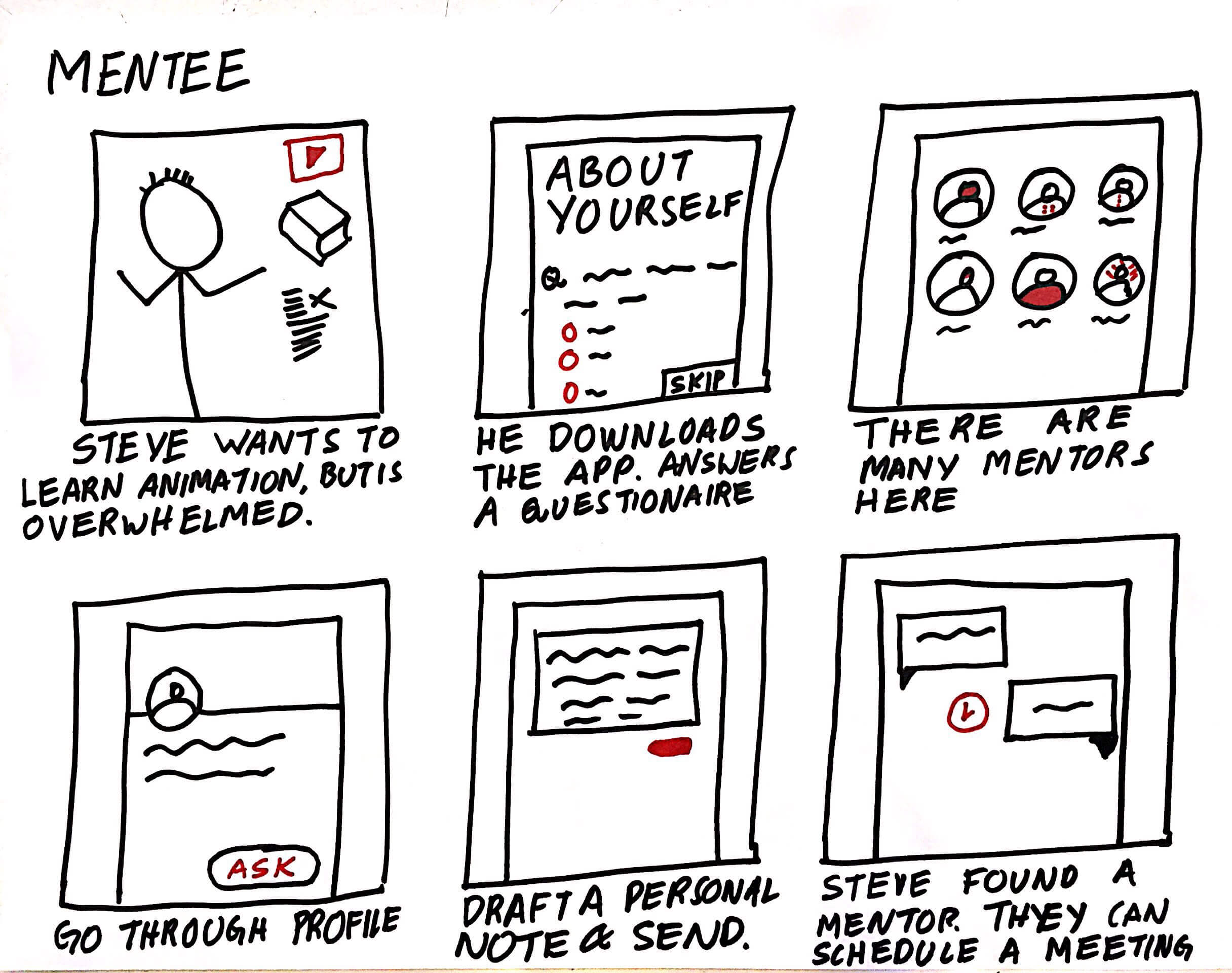
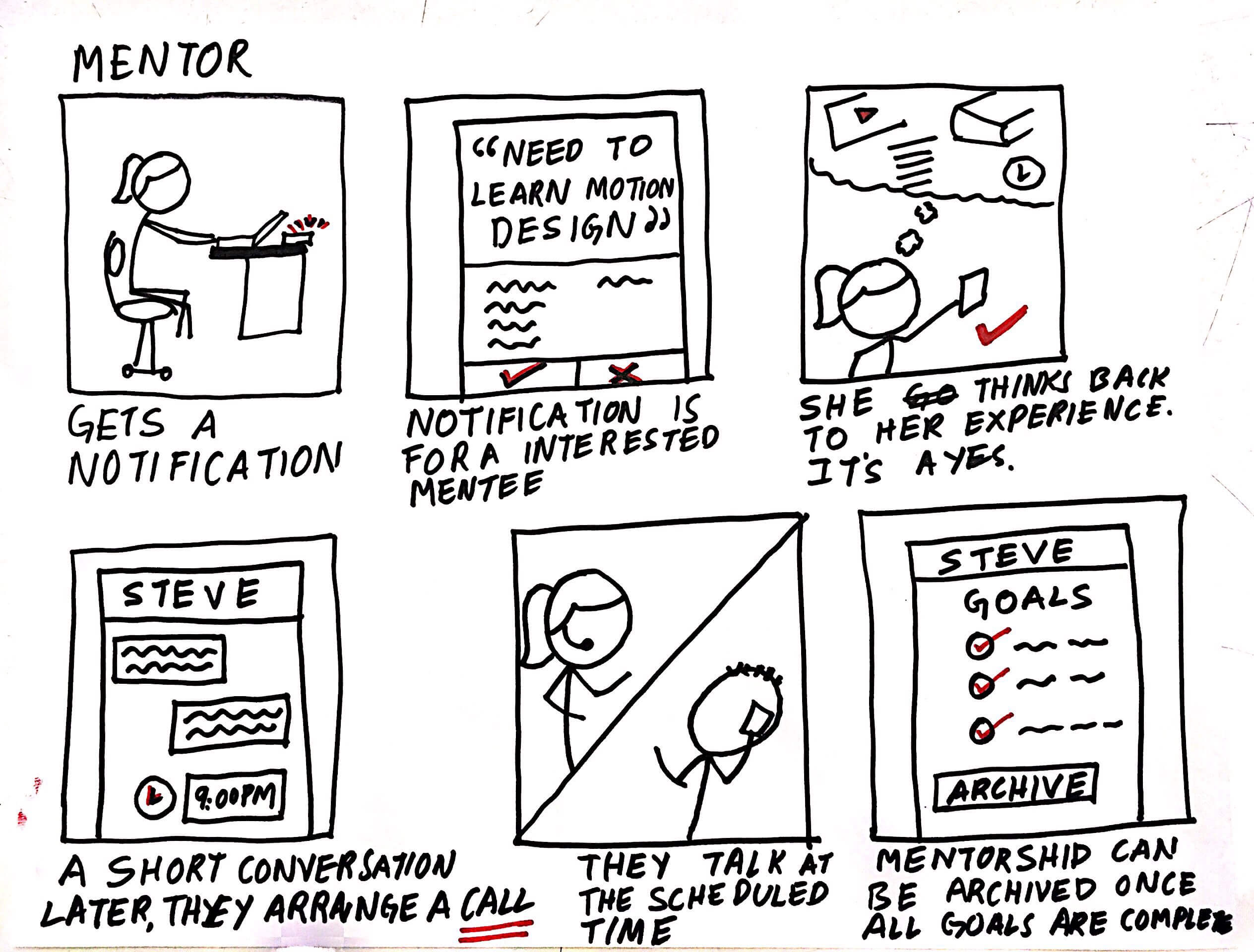
User Flows
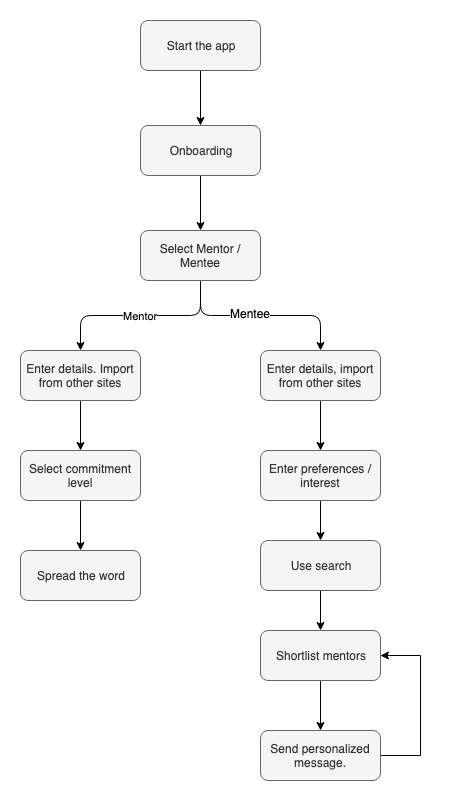
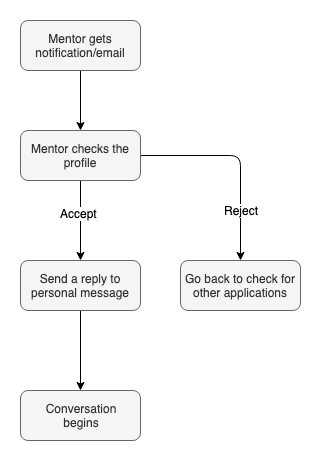
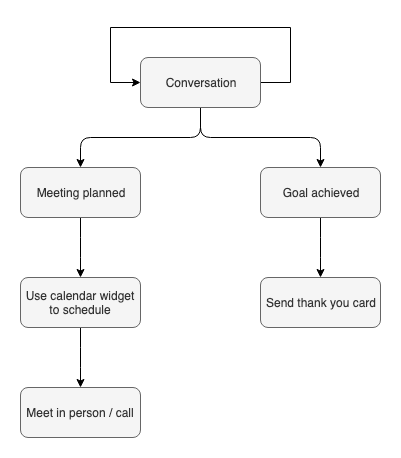
Next steps
Conduct more interviews. Mentorship varies with profession.
Conceptualize a desktop as well. It makes sense to have a desktop app / website for this system. Since significant reading, writing is involved.
Test and iterate!
Some lessons
Some extra synthesis steps, can help get more insights from existing data.
-
UI design can take a lot of time.
-
Best way to learn about a new design system is to use it. It has been a while since I've used an android phone, and a lot has changed since then.


